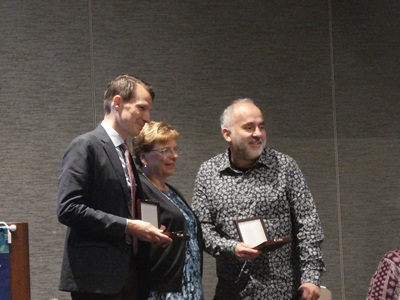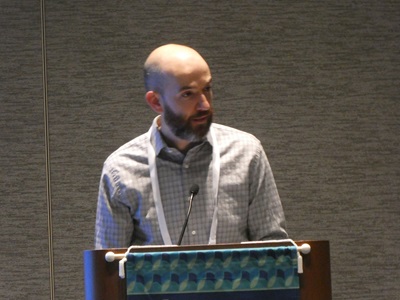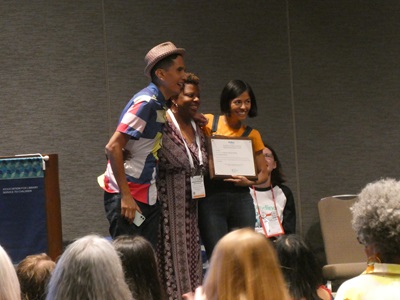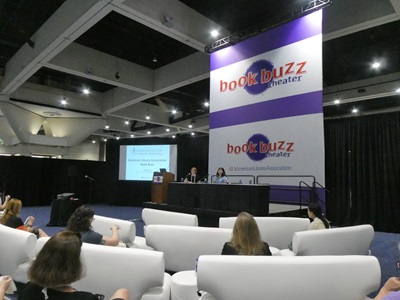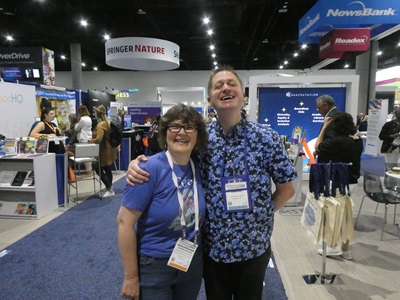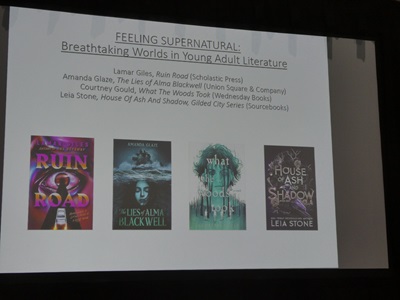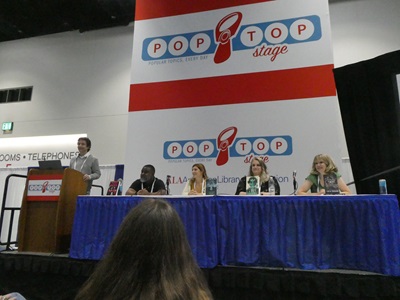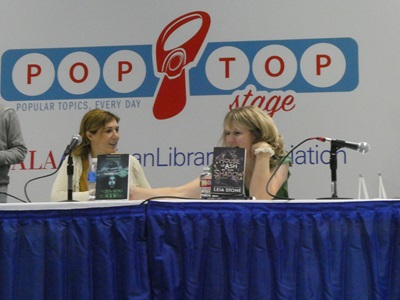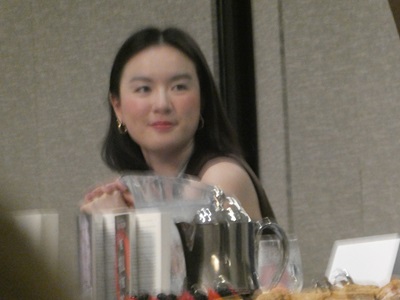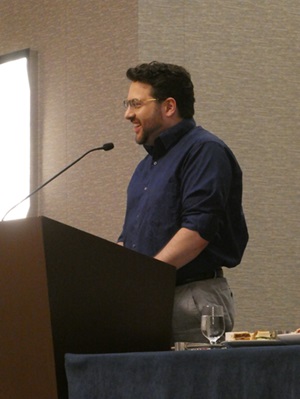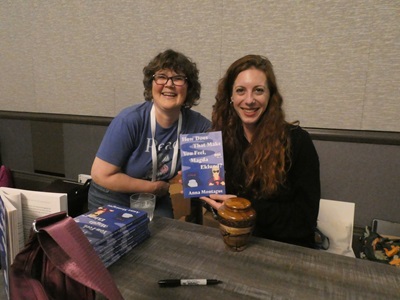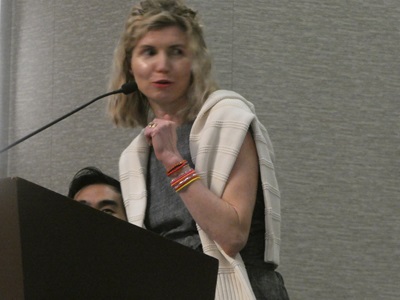My final day at ALA Annual Conference began by checking out of my hotel and storing my luggage – so I ended up being late to the ALSC Awards and Breakfast and got to the front of the line right after they ran out of food. Oh well! A neighbor did split a bagel with me.
But the ALSC Awards were lovely, as always. The winners gave short speeches, so I only have brief notes, but let me share a little bit of that.
Here are Nicholas Day and illustrator Brett Helquist receiving the Sibert Medal for The Mona Lisa Vanishes:
Brett Helquist talked about getting his artistic education in the library reference section, looking at the art books and a book called Anyone Can Draw. He never did stump the New York Public Library librarians when looking for a picture reference.
Nicholas Day began the book in 2020 and says, “Paris is a good place to visit in your head.” He also commented that “vital” is what people say before they underfund you. And we lead people to fiction through fact.
The wonderful book Houses with a Story, by Seiji Yoshida, won the Batchelder Award for best book in translation. This award is given to the publisher, so a representative of Abrams Books spoke:
This book demonstrates the breadth and depth of translated books. How to describe it? Each house tells its story but invites the reader to fill in the blanks. Imagination and reams are universal. Invites us to travel to places in our imaginations.
Corey R. Tabor was the Geisel Award winner, for Fox Has a Problem.
Beginning Readers deserve great books, too. Early readers are the most joyful.
The program finished off with the award for Excellence in Early Learning Digital Media, with these enthusiastic creators:
After the ALSC awards, I headed to the Exhibit Hall, and attended a couple sessions at the Book Buzz theater to hear about books I’ll surely be ordering for our library system.
Walking around the exhibits, I ran into John Schu, author of Louder Than Hunger.
I’d talked with John the night before, and felt like I’d slighted him by taking a picture with Jason Reynolds, but not with him! Before becoming an author, John was a librarian, and I’d become familiar with him from comments on the Heavy Medal Newbery blog, then served on an ALSC committee with him and got in the habit of talking with him at conferences. He’s a kind person who has that Mr. Rogers quality of talking with and seeing the person in front of him, and I’m happy to be his friend, however peripherally. Just such a kind person.
The next session I took notes about was “Feeling Supernatural: Breathtaking Worlds in Young Adult Literature,” featuring Lamar Giles, Amanda Glaze, Courtney Gould, and Leia Stone. Some highlights:
Q: How do you define supernatural?
LG – Breaking rules of reality.
AG – Past secret having power over us today.
CG – Predominantly based in reality, with speculative elements to increase stakes.
LS – At the start you think she’s human with no power – then magic surprises you.
Q: How do you decide what to keep close to reality?
LG – Like it to follow the rising action of the plot – get more supernatural as action rises.
AG – Love when magic hides in plain sight. If you squint, you might see it.
CG – Hers are close to contemporary with supernatural elements added. Monsters emphasize their underlying fears.
LS – Main character cursed to feel pain when touched – based on fibromyalgia.
Q: What are the rules that bind your antagonists?
LS – Tries not to write herself into a corner, so not too many rules.
CG – Simple but effective: What does the character need to learn? Also must be able to overcome the antagonist.
AG – Also in tandem with what the character needs.
LG – A Faustian element – a businessman who deals in the supernatural. How do you trip up a bad businessman?
Q: All your books include suspense. Do you plan it out in advance?
LG – A lot of it is trial and error and comes out in the rewrite.
AG – First draft is you telling yourself the story. Revision is for the reader. Outside readers help.
CG – Has an idea of the Twist when she starts: it’s a twisting-the-knife moment – but it changes by the time she gets there.
LS – She’s a pantser. She guards her writing time and writes it and it comes to her.
Q: History or legends? Research?
LS – Got into fantasy because you don’t need research. She only writes about places she’s been to.
CG – Did research on wilderness survival. Monster research – different kinds of cryptids.
AG – Her books are inspired by something that happened in history. This book – Winchester Mystery House – houses the spirits of the victims of rifles. Folks who worked there gave her lots of info. When she gets stuck, she goes back to the research.
LG – Based in history – Guy with a deal with the devil for music plus desegregation and a school that closed.
Q: Advice on writing heavy topics for a YA Audience?
LG – When writing about grief, approach it honestly.
AG – She doesn’t hold back. “You can always close a book.”
CG – Never wants to act like she’s teaching teens a lesson. Didn’t pull any punches writing about the troubled teen industry.
LS – Teens go through all the things adults go through. Teens just want to feel normal!
After that event, it was time to head a couple of hotels away to a ticketed event, the Author Gala Tea. This event features adult authors, but you get some nice in-depth speeches from each author. (I didn’t get great pictures in the big hall, but here are some.)
First up was Chloe Gong, with a new book coming out called Vilest Things. She wrote her first adult book when she turned 21, while isolated during Covid. It’s Antony & Cleopatra meets The Hunger Games.
Her protagonists are all on different sides. Not a romantasy, but the original toxic situation. This is the middle book of a trilogy.
Everything she writes is for her younger self – who only read library books.
Next was Tom Ryan, author of The Treasure Hunters Club, set in Nova Scotia.
A librarian pointed him from Lois Duncan to Agatha Christie and hooked him on mysteries. Bring a group of interesting characters together in a great setting and start killing them off.
Another book from the childhood librarian was called Blue Nose Ghosts about ghosts of Nova Scotia. Those tales get in the book, too. This librarian emails him after every book about how proud she is.
The next speaker was Lev A.C. Rosen, author of Rough Pages:
This book is the third in a series. His book Jack of Hearts was the 23rd most challenged book in the U.S.
Books can change us. They help us see the humanity in people. Reclam our identity. They heal us.
Rough Pages talks about when sending gay books through the mail was a federal crime, but there were folks who operated a queer book service. In the early 1950s, these publishers went under. In 1953, the ALA came out with its Freedom to Read statement. People were banning books left and right.
This is a book about stories – who gets to read them and who gets to tell them.
These things come in cycles. We’ve gotten through this before.
Next up was Justinian Huang, author of The Emperor and the Endless Palace
When he first came out to his dad, he was told that Asian people can’t be gay. This romantic thriller defies that, spanning 2000 years. It’s about a couple reincarnating, always destined to be doomed lovers. The true story it’s based on proved that gay Chinese people go back thousands of years.
The next speaker, Anna Montague, had the book with my favorite title: How Does That Make You Feel, Magda Eklund?
When I showed her my nametag in the signing line, she was so excited, she wanted a picture with me!
Her book is about a road trip with an urn of ashes.
It all started because her therapist broke up with her in 2020. Then her elderly friends got her thinking about the golden periods of our lives.
Magda’s best friend dies unexpectedly. She is given her friend’s correspondence and the urn of her ashes. It’s a meditation on female friendship. It’s also about grief – and the absurdity inherent in it.
Chris Whitaker spoke next, author of All the Colors of the Dark
He regaled us with stories of his life. He started going to libraries when he was 8 or 9 and his parents divorced. A man his mother dated broke his arm one night when he was ten. He later got stabbed on the street. Had PTSD and got a self-help book from the library. He told about starting at a stock trading company and owing them a million dollars but not how he managed to pay that off!
He quit his job to become a writer. Then ended up working 3 jobs. But it all changed when one of his books became a bestseller.
The final speaker was Katy Hayes, author of Saltwater.
Libraries are airports where you can fly anywhere for free. She went to her local library because it had air conditioning – but it also offered her a portal to a larger world.
In suspense fiction, the atmosphere sets the tone. This book is set on the island of Capri. In the early 1990s, there was a death. Then 30 years later, it happens again. It’s an island full of illusion, obsessed with appearances. There are three dead bodies in this book, which has to be a win, right?
It’s about a family who has everything and the women who will stop at nothing to escape them.
Can we believe what we see? All mysteries and suspense novels are magic tricks.
And that’s it – the last of my notes from ALA Annual Conference 2024. I hoped you enjoyed this taste of the conference!
